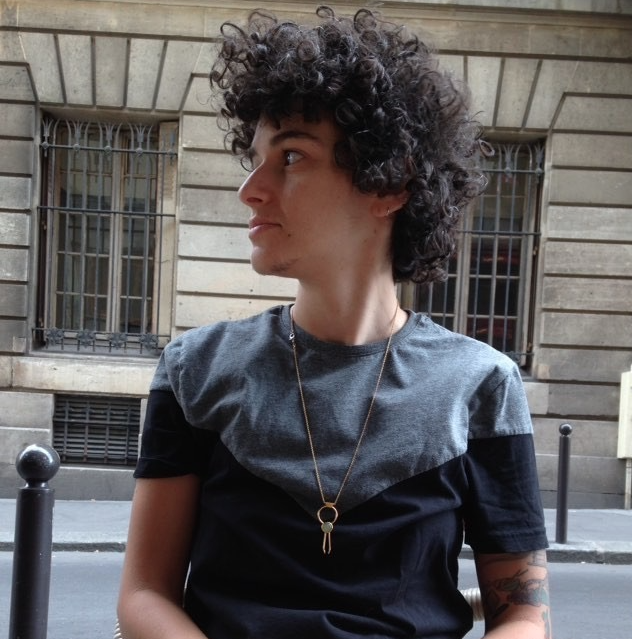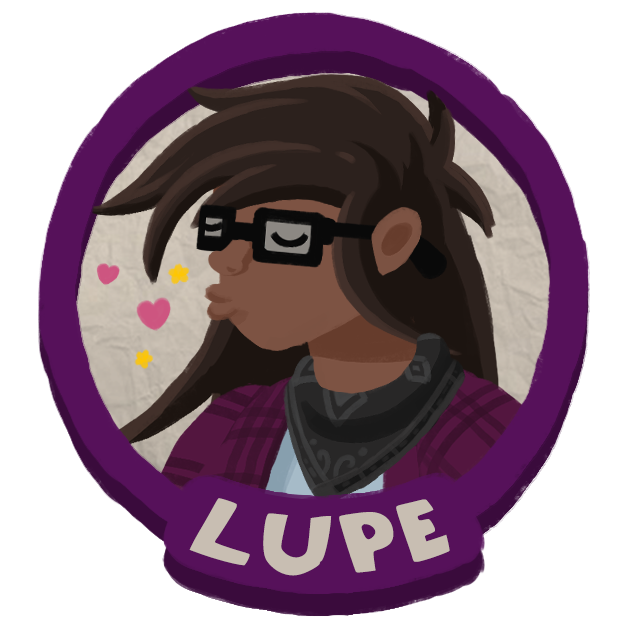Mo Cohen

- Role: Indie developer
- Location: Portland, OR
Queerly Represent Me chatted with Mo Cohen, an indie game developer based in Portland, OR.
QRM: Can you tell us a little bit about who you are and what you do in the games industry?
Mo: I'm an indie dev hobbyist, so I make games in my spare time. I do programming, writing, and design.
QRM: How long have you been involved in the game industry, and what projects have you worked on? What are you working on currently?
Mo: The first game I made was probably 5 years ago now. It's called Queertastrophe, and it's about being at a queer dance party trying to hit on babes while avoiding your exes. I've remade that game three times now and built an arcade cabinet for it. Most of my time in games has been spent on game jams and rebuilding tiny games (for example I keep remaking snake, but with mullets) so I can get a better grasp at programming and tools. Now that I'm more confident in my skills, I'm using everything I've learned to make my first full game, Queer Quest. It's a point-and-clit adventure, inspired by games like The Longest Journey and King's Quest. (I like to say it's a gay Monkey's Island meets a feminist Leisure Suit Larry.)
QRM: What inspired you to get started in the games industry?
Mo: It's an almost-weird story. I was a grad school drop-out living as a barista in Brooklyn. And I was good at latte art. I had no direction in my life and was trying to figure out my next step. Then I looked down at the latte art I was making, and I realized that a lot of it depicted video games. If I could make video game lattes, maybe I could make video games? I wasn't a programmer but I wasn't afraid of computers. So I googled something like "Queer Video Game Making" and I found Anna Anthropy's book, Rise of the Videogame Zinesters. I downloaded Game Maker, and I made Queertastrophe. I haven't looked back since.
QRM: In what ways do you feel your experiences as a queer person manifest in the games you work on, and influence the work you do?
Mo: Pretty directly. All I want is to make queer games. For example, Queertastrophe is all about queer dance parties, a scene I was heavily into for a long time. Queer bar events are, for better and worse, sort of like queer church, where folks can gather and see and be seen by their community. A lot of the characters on the dance floor in the game are based off of my friends. The awkwardness of avoiding your exes while still having a good time at a party is a fairly well known experience in queer scenes. With my current project, Queer Quest, I get to flesh out characters more because the genre allows for it; I get to tell more stories about being queer and being lucky enough to be surrounded by other queers.
QRM: Do you have a favourite queer character—in games or media more generally? If so, what is it about them that makes them your favourite?
Question asked by @kamienw.
Mo: No long term favorite, but I recently binge-watched Please Like Me and I absolutely adore one of the main character's partners, Arnold. He's a really anxious queer who has panic attacks and talks about his feelings openly, and has the dreamiest eyes. Seeing him work through anxiety helped give me tools to do the same. (When Arnold has a panic attack, his boyfriend asks him logical, reality-rooted questions. While I knew that was a tool to help folks with anxiety, seeing it happen helped me recognize in myself when I'm stressed out and then to ask myself those types of questions.) Also I adore Garnet from Steven Universe (who doesn't?) and all the queers in Sense8.
QRM: Have you ever encountered roadblocks in trying to include queer characters in games? What do you think is preventing greater diversity within games?
Question asked by @dustinalex91.
Mo: Personally, I haven't had an issue putting queers in games, but it's easier because I'm in control of the games I make and am not answering to a boss. I think the lack of diversity in games is a reflection of the lack of diversity of people working on them. People bring their background, their experiences, into their art. Queer artists make queer art, even if it's subconsciously. Folks who are cis/white/male/from some related privileged sector of life bring that privilege into the dialog they write, the characters they draw, etc. And when they try to make characters from other genders/walks of life, they need examples to work off of, and a lot of the examples out there are... not created by the folks they represent. So it's this messy spiral we gotta help get games out of. More good representation created by minority groups gives more room to grow and show others how it's done.

QRM: Why do you think it is important that queer audiences are able to see themselves represented in the games they play, and in the developers who make the games they see? What can we do to improve the industry for queer audiences and devs?
Mo: I've been getting a tattoo sleeve of games I grew up on. I can't get the main characters from those games tattooed to me because they all look pretty similar (cis white dudes). Obviously we need more queer representation so my sleeve can look dope 😊 But also, more seriously, when I come across a character I relate to, something happens. I stop and reflect on that character. I invest in the story. I say, "Wow, there's a female game developer character? In a game? I've never seen that. I'm kind of like her" (re: Thimbleweed Park). Then I wonder, do cis/white/straight dudes playing video games ever stop to look at the characters they play and feel appreciative that they can see themselves in these games? Or do they just feel nothing because so much media is carved in their image?
And also, queers have so much to teach each other. For example, I was playing Ladykiller in a Bind, and there's a sex scene where a character has to go look up directions on their phone to make sure they're tying the player up right/safely. This is a subtle and beautiful moment where people interested in rope play can say, "Oh, I can Google videos on how to do it. And I can use them as reference while I do it." Sure, the kink community isn't necessarily queer, but there's overlap, and that game has similar lessons about pronouns and gender exploration (e.g. there's a convo where the player can misgender someone and politely be corrected).
QRM: Have you ever mentored somebody in your role in games, or been mentored? If so, what made these experiences worthwhile for you?
Question asked by @pepelanova.
Mo: I'm currently mentoring the musician for Queer Quest as she enters the terrifying world of programming bootcamp. The other week she made a project in Unity and she's starting to learn how satisfying making games can be. Even though she's in the bootcamp for all types of programming, I'm crossing my fingers that my influence will help lean her towards games.
Most of the mentors I've had have been in programming—not always games related—but there are some in my local game dev community (PIGSquad) who I turn to when I need help debugging character walk cycles and making animations smoother. Mentoring is possibly the most magical thing about programming to me; it's this community built around lifting each other up. Mentoring is powerful.
QRM: In what ways can non-queer folk increase and support queer diversity present within games, as well as in the industry more broadly? How can we all work to support intersectional approaches to diversity, and why is this important?
Mo: With their money 😉 Patreon is amazing for supporting queer artists. Follow queer game developers on Twitter, retweet their accomplishments, buy their games and play them, and write constructive reviews. Show your non-queer friends these games. Hire queers. Remember that it's all intersectional, so don't just hire white queers that fit some beauty norms, or you'll be missing out on a lot of untold stories. Have conversations in your game dev communities about diversity, ask questions with the intention of learning and not leading. Read about intersectionality so you can help identify what works and what hurts.
*
You can find Mo on Twitter at @mosplaining and @queermogames.
You can check out Mo’s games on their website and support their work on Patreon.
